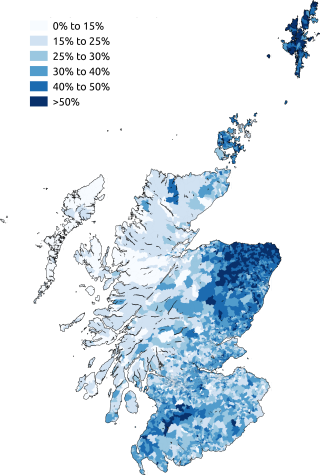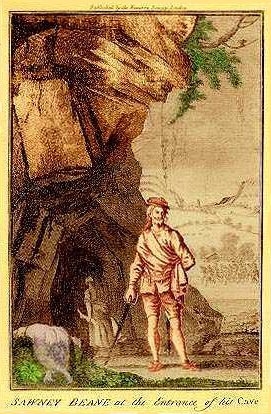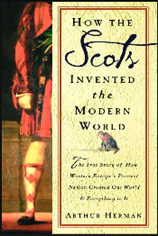
Hogmanay is the Scots word for the last day of the old year and is synonymous with the celebration of the New Year in the Scottish manner. It is normally followed by further celebration on the morning of New Year's Day and, in some cases, 2 January—a Scottish bank holiday. In a few contexts, the word Hogmanay is used more loosely to describe the entire period consisting of the last few days of the old year and the first few days of the new year. For instance, not all events held under the banner of Edinburgh's Hogmanay take place on 31 December.

Jacobitism was a political ideology advocating the restoration of the Catholic House of Stuart to the British throne. When James II of England chose exile after the November 1688 Glorious Revolution, the Parliament of England ruled he had "abandoned" the English throne, which was given to his Protestant daughter Mary II of England, and her husband William III. On the same basis, in April the Scottish Convention awarded Mary and William the throne of Scotland.

Scots is a language variety descended from Early Middle English in the West Germanic language family. Most commonly spoken in the Scottish Lowlands, the Northern Isles of Scotland, and northern Ulster in Ireland, it is sometimes called: Lowland Scots, to distinguish it from Scottish Gaelic, the Celtic language that was historically restricted to most of the Scottish Highlands, the Hebrides, and Galloway after the sixteenth century; or Broad Scots, to distinguish it from Scottish Standard English. Modern Scots is a sister language of Modern English, as the two diverged from the same medieval form of English.

The British pre-decimal halfpenny, once abbreviated ob., is a discontinued denomination of sterling coinage worth 1/480 of one pound, 1/24 of one shilling, or 1/2 of one penny. Originally the halfpenny was minted in copper, but after 1860 it was minted in bronze. In the run-up to decimalisation, it ceased to be legal tender from 31 July 1969. The halfpenny featured two different designs on its reverse during its years in circulation. From 1672 until 1936 the image of Britannia appeared on the reverse, and from 1937 onwards the image of the Golden Hind appeared. Like all British coinage, it bore the portrait of the monarch on the obverse.
Scottish English is the set of varieties of the English language spoken in Scotland. The transregional, standardised variety is called Scottish Standard English or Standard Scottish English (SSE). Scottish Standard English may be defined as "the characteristic speech of the professional class [in Scotland] and the accepted norm in schools". IETF language tag for "Scottish Standard English" is en-scotland.
The Ulster Scots people or Scots-Irish are an ethnic group descended largely from Scottish and Northern English Borders settlers who moved to the northern province of Ulster in Ireland mainly during the 17th century. There is an Ulster Scots dialect of the Scots language.

Alexander "Sawney" Bean is a legendary figure, said to have been the head of a 45-member clan in Scotland in the 16th century that murdered and cannibalised over 1,000 people in 25 years. According to the legend, Bean and his clan members were eventually caught by a search party sent by King James VI, and were executed for their heinous crimes.

The merk is a long-obsolete Scottish silver coin. Originally the same word as a money mark of silver, the merk was in circulation at the end of the 16th century and in the 17th century. It was originally valued at 13 shillings 4 pence, later raised to 14s. Scots.

Yokel is one of several derogatory terms referring to the stereotype of unsophisticated country people. The term is of uncertain etymology and is only attested from the early 19th century on.
John Ash was an English Baptist minister at Pershore, Worcestershire, and author of an English dictionary and grammar books.

A bawbee was a Scottish sixpence. The word means a debased copper coin, valued at six pence Scots, issued from the reign of James V of Scotland to the reign of William II of Scotland. They were hammered until 1677, when they were produced upon screw presses.
Middle Scots was the Anglic language of Lowland Scotland in the period from 1450 to 1700. By the end of the 15th century, its phonology, orthography, accidence, syntax and vocabulary had diverged markedly from Early Scots, which was virtually indistinguishable from early Northumbrian Middle English. Subsequently, the orthography of Middle Scots differed from that of the emerging Early Modern English standard that was being used in England. Middle Scots was fairly uniform throughout its many texts, albeit with some variation due to the use of Romance forms in translations from Latin or French, turns of phrases and grammar in recensions of southern texts influenced by southern forms, misunderstandings and mistakes made by foreign printers.

Cockburn is a Scottish surname that originated in the Borders region of the Scottish Lowlands. In the United States most branches of the same family have adopted the simplified spelling 'Coburn'; other branches have altered the name slightly to 'Cogburn'. The French branch of the family uses the spelling 'de Cockborne', with the middle "ck" being pronounced.
The Scottish vowel length rule describes how vowel length in Scots, Scottish English, and, to some extent, Ulster English and Geordie is conditioned by the phonetic environment of the target vowel. Primarily, the rule is that certain vowels are phonetically long in the following environments:
Anti-Scottish sentiment is disdain, discrimination, or hatred for Scotland, the Scots, or Scottish culture. It may also include the persecution or oppression of the Scottish people as an ethnic group or nation. It can also be referred to as Scotophobia or Albaphobia.

How the Scots Invented the Modern World: The True Story of How Western Europe's Poorest Nation Created Our World & Everything in It is a non-fiction book written by American historian Arthur Herman. The book examines the origins of the Scottish Enlightenment and what impact it had on the modern world. Herman focuses principally on individuals, presenting their biographies in the context of their individual fields and also in terms of the theme of Scottish contributions to the world.

The Jacobite rising of 1745 was an attempt by Charles Edward Stuart to regain the British throne for his father, James Francis Edward Stuart. It took place during the War of the Austrian Succession, when the bulk of the British Army was fighting in mainland Europe, and proved to be the last in a series of revolts that began in March 1689, with major outbreaks in 1715 and 1719.

The Scottish people or Scots are an ethnic group and nation native to Scotland. Historically, they emerged in the early Middle Ages from an amalgamation of two Celtic peoples, the Picts and Gaels, who founded the Kingdom of Scotland in the 9th century. In the following two centuries, Celtic-speaking Cumbrians of Strathclyde and Germanic-speaking Angles of Northumbria became part of Scotland. In the High Middle Ages, during the 12th-century Davidian Revolution, small numbers of Norman nobles migrated to the Lowlands. In the 13th century, the Norse-Gaels of the Western Isles became part of Scotland, followed by the Norse of the Northern Isles in the 15th century.

Scottish literature in the eighteenth century is literature written in Scotland or by Scottish writers in the eighteenth century. It includes literature written in English, Scottish Gaelic and Scots, in forms including poetry, drama and novels. After the Union in 1707 Scottish literature developed a distinct national identity. Allan Ramsay led a "vernacular revival", the trend for pastoral poetry and developed the Habbie stanza. He was part of a community of poets working in Scots and English who included William Hamilton of Gilbertfield, Robert Crawford, Alexander Ross, William Hamilton of Bangour, Alison Rutherford Cockburn, and James Thomson. The eighteenth century was also a period of innovation in Gaelic vernacular poetry. Major figures included Rob Donn Mackay, Donnchadh Bàn Mac an t-Saoir, Uillean Ross and Alasdair mac Mhaighstir Alasdair, who helped inspire a new form of nature poetry. James Macpherson was the first Scottish poet to gain an international reputation, claiming to have found poetry written by Ossian. Robert Burns is widely regarded as the national poet.














